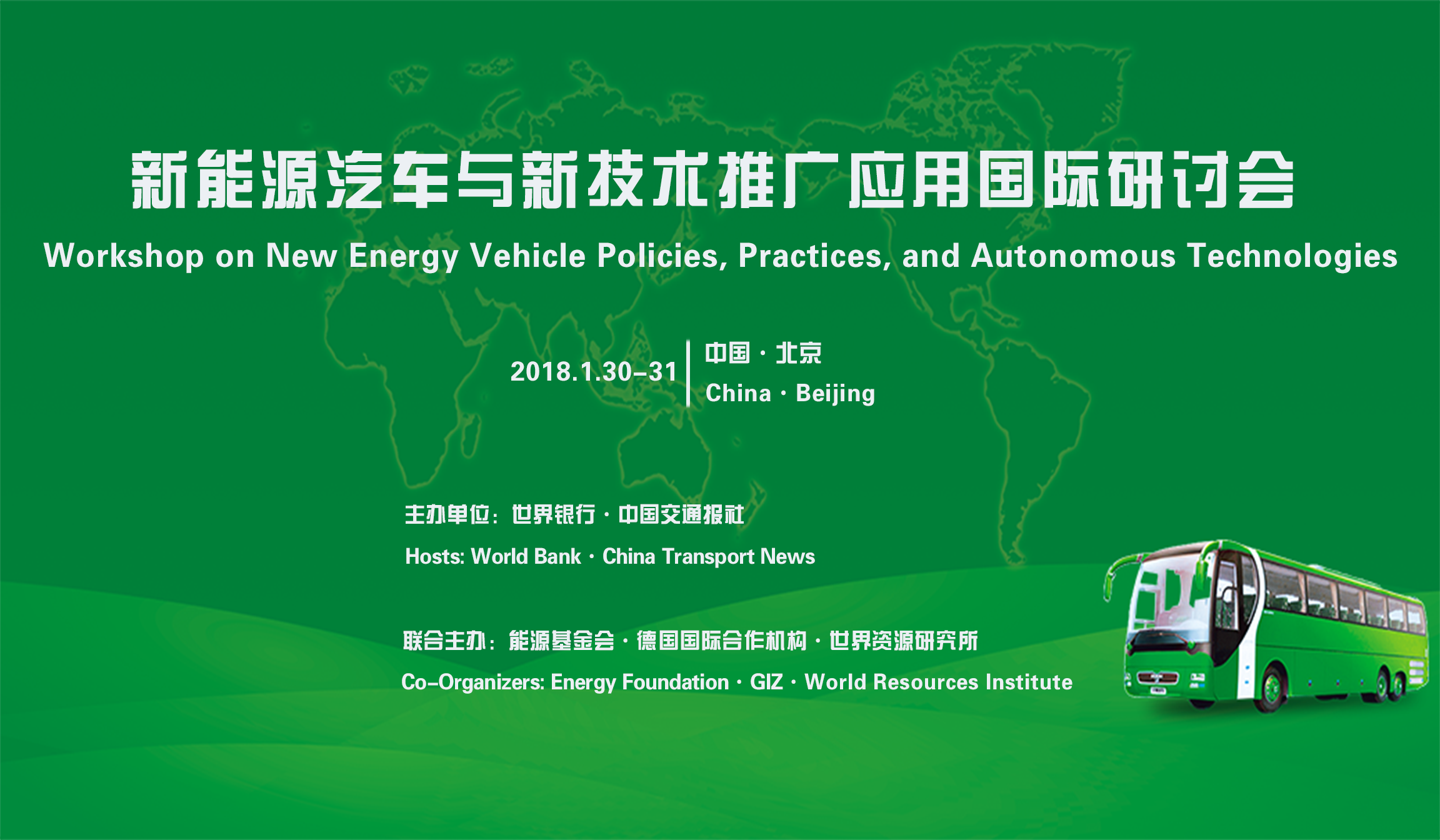Workshop on New Energy Vehicles and Autonomous Technologies
2018.01.31

ACTIVITY INTRODUCTION
The workshop titled “New Energy Vehicle Policies, Practices, and Autonomous Vehicles” was held in Beijing from January 30 to 31, 2018.
The workshop was jointly organized by the World Bank, China Transport News, Energy Foundation, GIZ and World Resources Institute. It is part of the Bank’s project titled Reducing Large-City Congestion Carbon under the initiative of Global Environment Facility (GEF).
Sixteen distinguished experts, from the World Bank, World Resources Institute, Society of Automotive Engineers of China, AnKai Bus and other organizations, shared their insights and exchanged ideas on the promotion of new energy vehicles and the future of self-piloting technologies. More than 100 representatives from transport administrative agencies, research institutions, and the private sector attended this event and joined the discussions on reforms and innovations in the new energy vehicle industry.
According to the director at the Transport Service Department of the Ministry of Transport, the promotion and application of new energy vehicles is key to China’s strategies of developing green transportation, building a powerful transportation country and a smart society. By the end of 2017, there were over 300,000 new energy vehicles nationwide, and the number is estimated to double by 2020.
Cui Hongyang, a researcher at the International Council on Clean Transportation, suggested that various economic incentives with “visible” benefits to customers are critical for the further promotion of new energy vehicles. Zhang Haitao, from the Shenzhen Urban Transport Planning and Design Institute, presented his study on five cities including Beijing and Shenzhen and concluded pure electric buses substantially saved energy and reduced emissions. According to data he gathered in 2016, the energy consumption of a pure electric bus is from 80.8 kWh to 124.2 kWh per100 kilometer, a reduction of 65 % to 80 % compared to traditional vehicles.
Nupur Gupta, the Indian GEF project manager, introduced measures adopted by the Indian government to accelerate the application and production of electric vehicles. He also mentioned India is setting up more charging piles by integrating cutting-edge technologies. Marcus Wagner, the project manager at the GIZ, said Germany is conducting researches on autonomous driving and connected vehicles, but remained cautious of a large-scale application of driverless cars.
COLLECTION
1 交通运输领域推广应用新能源车现状与趋势 高博
This document introduces the status quo and emerging trends of new energy vehicle development both in China and abroad. It also discusses efforts made by the Ministry of Transport of China, and identifies strategies and working plan for the next move.
2 中国城市新能源乘用车激励政策评估 崔洪阳
This document analyzes the characteristics of new energy passenger vehicle markets in Chinese cities, summarizes and compares promotion policies at the city level, and identifies practical strategies and activities that may lead to sustainable development of new energy passenger vehicle market in the post-national subsidy era.
3 德国交通与燃料战略的最新进展 Michael Krail
This document introduces the status quo and targets of the transport sector in Germany, the Federal Government’s Mobility and Fuels Strategy and the latest development.
4 新能源公交车辆运营评估体系研究 张海涛
Based on researches on battery electric buses and plug-in hybrid power buses in pilot cities of China, the document explains the characteristics of new energy vehicles performance and summarizes the experience of operation organization.
5 印度新能源公交车的推广政策 Nupur Gupta
This document introduces strategies and actions taken by the Indian government to accelerate the application of electric vehicles.
6 中国新能源汽车产业发展情况 王菊
This document includes an overview of China’s automobile industry, policy system and development trends for new energy vehicles, and international cooperation.
7 面向公交优先的新能源客车 陈顺东
After an introduction to the company’s products and R&D capacities, representatives from Ankai share their latest thoughts on the development of new energy buses in China.
8 上海中运量公交运营及效果评估 郭凯
A specific case study on the medium capacity transit system in Shanghai, China’s business center.
9 中国“双积分政策”导向、影响及未来管理展望 任焕焕
This document develops an in-depth analysis of China’s CAFC and NEV credit regulation.
10 宜居城市的共享出行准则 刘岱宗
The expert from World Resources Institute portrays how mobility should look like in the future and highlights shared mobility principles for building livable cities.
11 电动汽车公共充电设施的发展及布局规划 姚恩建
In the first half part, this document discusses the construction, operation, and problems of electric vehicles (EV) and public charging stations in China. In the second half, it studies on the deployment of EV public charging stations based on user activity analysis.
12 捕捉自动驾驶车辆的潜在效益 Arturo Ardila Gomez
Centering on shared mobility principle and sustainable mobility for all, this document presents a cost and benefit analysis of autonomous vehicles.
13 机动车智能化发展趋势与障碍 周炜
This document touches vital issues related to the development of intelligent motor vehicles, including the emerging trends, common misconceptions, and critical barriers. In the end, it gives several solid recommendations.
14 各国自动驾驶汽车政策及法律演进 张丽君
The document presents and compares key laws and regulations related to autonomous vehicles in foreign countries. Then it discusses several critical legal and policy challenges for the driverless cars in China.
15 自动驾驶汽车测试评价与车路协同应用实践 曹飞
The document provides details on test and assessment of intelligent connected vehicles (ICVs), and discusses the application of intelligent vehicle infrastructure cooperative system (IVICS).
16 车路协同与未来智能交通的发展方向 李江
This document defines the future of transport as smart vehicles plus smart roads. It also predicts the traffic lights system should be a brain-like intelligent platform.
c81f661ad3131c1efd5f0c.pdf
c81f661ad3131c1efd6c0d.pdf
c81f661ad3131c1efd7d0e.pdf
c81f661ad3131c1efd8b0f.pdf
c81f661ad3131c1efd9610.pdf
c81f661ad3131c1efda211.pdf
c81f661ad3131c1efdae12.pdf
c81f661ad3131c1efdf513.pdf
c81f661ad3131c1efe0614.pdf
c81f661ad3131c1efe1615.pdf
c81f661ad3131c1efe2316.pdf
c81f661ad3131c1efe3117.pdf
c81f661ad3131c1efe3d18.pdf
c81f661ad3131c1efe4819.pdf
c81f661ad3131c1efe561a.pdf



